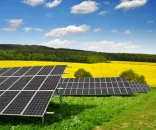More Bangladesh land grabs feared due to rising demand for renewable energy
Rising demand for the dominant form of renewable energy worldwide – wood – could drive yet more acquisitions of land in developing countries where food insecurity is rising and land rights are weak, say researchers at the International Institute for Environment and Development.
In a briefing paper published today (30 August), they warn that this new trend needs greater public scrutiny and debate.
Wood accounts for 67% of global renewable energy supplies, and many countries in the global North are increasing their use of it both to reduce their reliance on costly fossil fuels and to mitigate climate change.
Such countries are setting ambitious targets for using renewable energy, including biomass, but with demand for wood set to outstrip supply by up to 600% in some countries, and high tree growth rates in the tropics, investors are beginning to look South.
New tree plantations in developing countries that will be harvested to export wood could spell good news in terms of jobs, investment, climate change and conversation — if they are managed well.
But there is also a risk that plantations will displace poor and marginalised communities from land they have tended to for generations but have no formal claim over.
The paper, aimed at policymakers in both developed and developing countries, warns that rising demand for wood could harm food security and the livelihoods of the world’s poorest and most vulnerable people if governments lease large areas of land for fuel wood plantations.
“All eyes are turned to food and biofuels, but tree plantations for biomass energy may soon become an important driver in the global land rush,” says Dr Lorenzo Cotula, a senior researcher at IIED and co-author of the paper.
Duncan Macqueen, also a senior researcher and co-author adds: “Wood is a vital renewable energy source, and countries in the South should develop it for local energy security, not export it to fuel Northern energy deficits at the expense of their own people.”













 Advertise
Advertise











